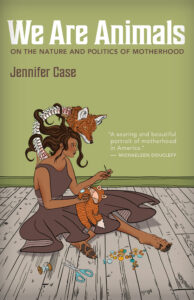 Review by DeMisty D. Bellinger
Review by DeMisty D. Bellinger
Jennifer Case’s second essay collection, We Are Animals: On the Nature and Politics of Motherhood (Trinity University Press, 2024), offers a raw and tender look at birth and motherhood in present-day America. Case exposes the continued problematic expectations of women in heterosexual relationships, while acknowledging biology and unfounded—sometimes, seemingly inexplicable—shame. Case is a professor in Arkansas who has an MA from the University of Nebraska-Lincoln and a PhD from Binghamton.
In the prologue, entitled “Message for the Animal Mother,” Case begins with “You are teats-tingling, hairy line from your pubis to your belly button, stretched skin that has spread and then shrunk to create ripples and dapples” (1). The beauty of that declaration, the unfiltered sincerity, grabs hold hard and does not let go until the end. I want to desperately believe at this entrance every mother sees herself here; I certainly see myself. And this just the prologue.
Throughout the collection, Case covers biology, but also the need for place and community as young mothers, on intended pregnancies and unintended pregnancies and how we decide to respond, on bodily autonomy, on the politics of birth including the politics of race and birth, and the capitalization and medicalization of birth and motherhood. She does this in candid essays, synthesizing research seamlessly into experiential events, but never delving into the didactic or academic.
However, through all this, we witness Case as a calm person, a mother and woman attuned to nature and the earth, to hiking and being, but still fearing the animalistic need to succumb to pain or anger. She asks, “When we let go of the need to control our physical and emotional selves, does the world around us disappear? Or do we simply become part of something larger?” (18). These questions come in the first essay, “We Are Animals,” where she recounts the birth of her first born, her daughter, an event harried with preeclampsia and surprising discomfort. Her husband describes the experience as easy. “You pushed her out like it was nothing. . . . You just popped her out,” and to that, Case says. “And I don’t know how to respond.” She contradicts him in the text, saying that it was the “most difficult thing I’ve ever done” (18). Here, we see how the world perceives her, but also childbirth, and how she perceives it.
Case’s second pregnancy is a surprise to her. She learns of it after discussing whether they should have a second child or not. Much to her husband’s chagrin, she did not want to try for a second one. As her husband and young daughter are outside playing and washing the car happily together, she realizes how her life and body were being used as a vessel, that she is “a cog in the play of evolution” (45). The essay “Unintended” is as much about how we are at the mercy of nature as we are at the mercy of the politicalization of our bodies. Further, in the essay “A Political Pregnancy,” Case notes how normal unintended pregnancies are.
Because it is nearly impossible to have a home birth in Arkansas, Case and her husband acquire a midwife and a doula to help in the second pregnancy. She wants natural as possible. She wants to be able to birth the baby in a calm environment, unlike with her first child. And in spite of the constraints on her desires of a natural pregnancy by her husband and doctors, she gets her homebirth, as unexpected as the pregnancy. Here, Case allows the animality of birthing a child as her husband runs around in a near panic, trying to get her to the hospital. But her son is not concerned with hospital beds and monitors; he is ready to come out. Case moans into the birth, on the floor and in a comfortable position, and her baby comes easily.
Case covers a lot in this slim collection, and does so with such urgency and poetry that she makes reading her words—even the difficult parts of argument and pain—easy. Enjoyable. Always the right word, her well-written sentences as rhythmic as poetry, and imagery that brings you in. She reminds us, too, what a Trump presidency brings: an ignorance of reality, a denial of climate change, and a disregard for women and childbearing people’s lives. We Are Animals shows us that yes, we are part of something larger, we are products of a force more powerful than us.
We Are Animals: On the Nature and Politics of Motherhood by Jennifer Case
Trinity University Press, 2024, 224 pages, paper, $15.99
9781595343017
DeMisty D. Bellinger’s books include the short story collection All Daughters Are Awesome Everywhere, the novel New to Liberty, and the poetry collection Peculiar Heritage. She teaches in central Massachusetts, where she lives with her husband and twin daughters.
